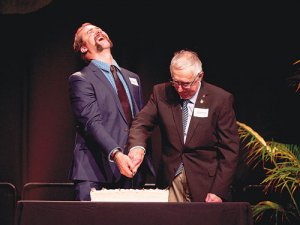NZYF launches employer supporter membership for rural businesses
New Zealand Young Farmers (NZYF) has launched a new initiative designed to make it easier for employers to support their young team members by covering their NZYF membership.
 2017 Young Farmer of the Year Nigel Woodhead and his 1970 counterpart Allan Anderson cut the birthday cake at the competition’s 50th anniversary celebration.
2017 Young Farmer of the Year Nigel Woodhead and his 1970 counterpart Allan Anderson cut the birthday cake at the competition’s 50th anniversary celebration.
The Young Farmer of the Year competition celebrated its 50th anniversary with a gala gathering of former winners, finalists and families held at the national final in Invercargill.
About 400 people attended, including the 1970 winner Allan Anderson, the longest-surviving champion, who cut the anniversary cake, and last year’s winner Nigel Woodhead.
“This is the first time we’ve had so many grand finalists in one room,” said NZ Young Farmers chief executive Terry Copeland.
The contest was first run in 1969, initially as a radio quiz with no practical elements.
In 1981, it set two new milestones with the first television broadcast and the first female finalist, Denise Clemens (nee Brown), a North Otago sheep and cropping farmer and part-time farm consultant.
“I admire the women who make it through now because the contest has a much larger practical component,” said Clemens.
“I don’t think it will be long until we have a female grand champion. Women can do anything.”
“It’s amazing. It’s just like a school reunion isn’t it?” said Levin farmer Geoff Kane, who won the 1981 title.
“We were all pretty green about what was required for television,” he said. “We were extremely dressed up and serious. Today the contest is more entertaining and has a bit more audience appeal.”
Kane still recalls the modules finalists had to tackle.
“Horticulture was just coming into its own in the 80s, so we had to plant and prune a few trees. We also had to hang gates, fix a water pump, repair the chain on a motorbike and deal with a tractor that had run out of diesel.”
The National Wild Goat Hunting Competition has removed 33,418 wild goats over the past three years.
New Zealand needs a new healthcare model to address rising rates of obesity in rural communities, with the current system leaving many patients unable to access effective treatment or long-term support, warn GPs.
Southland farmers are being urged to put safety first, following a spike in tip offs about risky handling of wind-damaged trees
Third-generation Ashburton dairy farmers TJ and Mark Stewart are no strangers to adapting and evolving.
When American retail giant Cosco came to audit Open Country Dairy’s new butter plant at the Waharoa site and give the green light to supply their American stores, they allowed themselves a week for the exercise.
Fonterra chair Peter McBride says the divestment of Mainland Group is their last significant asset sale and signals the end of structural changes.